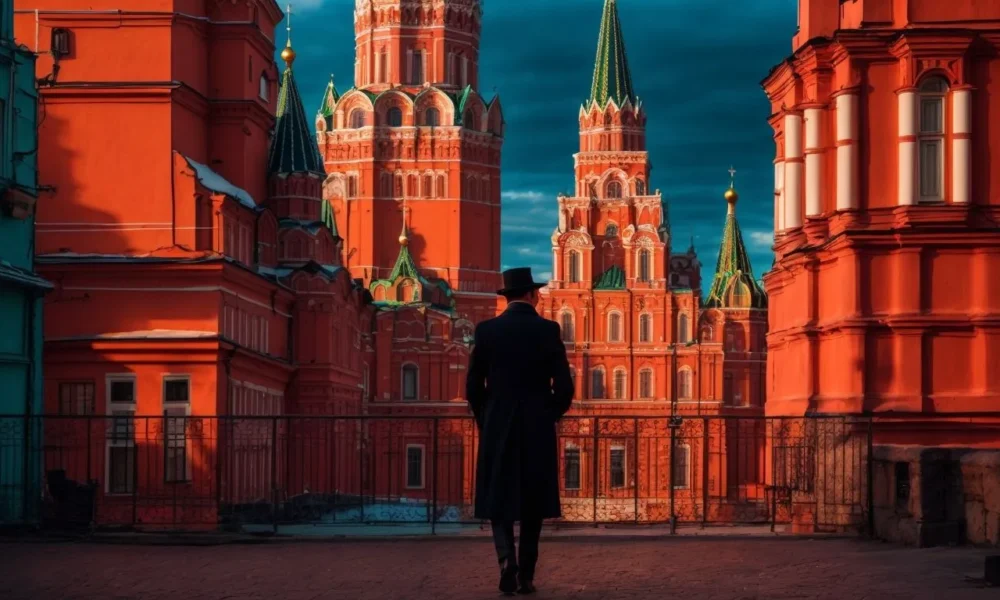Table of Contents
Amor Towles’ ‘A Gentleman in Moscow‘ is a literary marvel. This article explores its alluring intricacies. It has mesmerizing characters, a rich historical setting, and a captivating story.
Readers journey to 1922 Soviet Russia with Count Alexander Rostov. He is enclosed in the Hotel Metropol. Towles narrates a story that transcends physical barriers.
What makes ‘A Gentleman in Moscow‘ stand out? Not just its vivid Soviet-era depiction or intricate plot, but its carefully created characters. From Nina, a young friend of Rostov, to Andrey, a waiter with secrets – each one adds depth to the tale.
The novel is rooted in true history. It reveals how individuals cope with upheaval and seek solace in chaos. From communism to personal redemption, readers experience a time-travel, and discover resilience and grace.
Background of “A Gentleman in Moscow”
Amor Towles’ novel “A Gentleman in Moscow” is a captivating journey through Russia’s 20th-century turmoil. Count Alexander Rostov, an aristocrat, must stay in the grand Metropol Hotel due to his “crimes” against the Bolsheviks. As he navigates life in his isolated environment, he meets interesting characters and discovers love, friendship, and himself.
Towles’ narrative is timeless and thought-provoking. He paints pre-revolutionary Russia with detailed descriptions, and also touches on identity, loyalty, and personal growth. He intertwines real-life events with his story, giving readers an understanding of the era without sacrificing the enchantment. The confinement of Rostov in the hotel allows for a deeper look at Russian society.
When reading “A Gentleman in Moscow”, readers should look for recurring symbols and motifs. These add depth and reveal Rostov’s inner world.
Summary of the Plot
‘A Gentleman in Moscow‘ is a captivating tale. Count Alexander Ilyich Rostov, an aristocrat, is sentenced to house arrest in Hotel Metropol by the Bolsheviks. Here, his life takes exciting turns with many encounters and friendships. As he watches Moscow’s changes from afar, conversations and self-discovery keep him occupied. This narrative shows a man’s strength in the face of trouble.
Throughout the book, Count Rostov bonds with Nina. She introduces him to the hotel’s people and places, like Maitre d’ Andrey’s wife Anna Urbanova and Emile Zhukovsky, the chef. Despite his limited movement, he connects with guests like poet Osip Ivanovich Glebov-Strevsky and actress Sofia Belova. These relationships bring cheer and meaning to his isolated life.
Then, Nina’s love letters to Mikhail Fyodorovich Mindich turn the plot. Realizing their importance as evidence of disloyalty, the Count embarks on a mission. To keep them safe amidst political turmoil, he goes on a dangerous mission. This covert journey spices up his otherwise dull life.
In reality, there are many stories like ‘A Gentleman in Moscow‘. During World War II, Anne Frank’s diary showed hope in hopelessness. Similarly, Towles’ novel explores Count Rostov’s courage. They prove that even if we are held back, we can still find beauty. They are timeless messages of resilience and optimism.
Main Characters
To understand the main characters in “A Gentleman in Moscow,” dive into the lives of Alexander Rostov, Nina Kulikova, and Sofia. Discover the role each character plays in the story and their significance to the overall narrative.
Alexander Rostov
Go bananas! Let’s get wild! Life is too short to be boring. Let’s live it up and make every moment count.
Go bonkers! Get wild! Life’s too short to be dull. Let’s enjoy it and cherish every second!
Nina Kulikova
Nina Kulikova is an extraordinary detective. She has exceptional deduction skills and is a master of analyzing complex cases. Her attention to detail is unrivaled, and she never stops seeking justice.
Mysteries surround her past, with whispers of incredible achievements. It’s said she single-handedly took down a criminal organization.
Her name evokes terror in criminals and confidence in those who need justice. Nina Kulikova is an enigma, and her character is defined by her incredible skills.
Sofia
Sofia is a 28-year-old, ambitious, creative, and resilient architect. Her technical skills and artistic flair have made her one of the most sought-after in her field.
Growing up in a family of artists, Sofia’s love for architecture was born at an early age. This has given her a unique perspective when it comes to design – creating structures that inspire and serve a purpose.
In addition to her professional career, Sofia is also committed to community projects. She strives to use architecture to make a positive impact on society, such as designing schools and sustainable housing solutions.
Themes and Symbolism
To explore ‘Themes and Symbolism’ in ‘A Gentleman in Moscow,’ we delve into its sub-sections: ‘Class and Social Hierarchy,’ ‘Adaptability and Resilience,’ and ‘Rediscovering Meaning in Life.’ Each sub-section uncovers significant themes and symbolic elements within the novel, offering a deeper understanding of its narrative and character development.
Class and Social Hierarchy
Class and Social Hierarchy are prevalent in societies. Individuals have different positions based on their class, which impacts their opportunities and life quality. Let’s explore a table outlining social classes and corresponding characteristics:
| Class | Characteristics |
| Upper Class | Inherit significant wealth, live luxurious lifestyles, access to exclusive networks, and possess high education. |
| Middle Class | Moderate income, basic amenities and educational opportunities, but may face financial constraints. |
| Working Class | Hold manual or blue-collar jobs, lower wages, may struggle to meet living expenses. |
| Lower Class | Face severe socio-economic challenges, limited access to education, healthcare, and employment. Live in poverty or near-poverty conditions. |
Mobility between classes is possible, but challenging due to systemic barriers like limited educational opportunities and unequal wealth distribution. Discussions on social hierarchies have gained traction globally, with Stanford University researchers conducting a study emphasizing the importance of reducing income inequality for a more equitable society.
Understanding class and social hierarchy is important for informed conversations about privilege, equity, and opportunity distribution.
Adaptability and Resilience
The following table outlines the importance of Adaptability and Resilience.
Adaptability is also characterized by being open-minded, flexible, and eager to learn. Resilience includes developing coping mechanisms, controlling stress, and keeping emotional balance.
Adaptability has played a major role in history. For instance, during World War II, countries had to adjust strategies quickly to changing battlefields. This flexibility contributed to their success in overcoming difficulties.
In conclusion, Adaptability and Resilience are essential in dealing with life’s problems while aiming for success. By accepting change with optimism, we can face the future with assurance and come out even stronger.
Rediscovering Meaning in Life
Journey to find life’s meaning is deep and personal. We delve into our soul, ask ourselves questions about beliefs, values and what matters. We examine relationships, find passions and seek purpose in everyday moments.
On this journey, we find hidden gems within us that have the power to shape our lives. We cherish the connections – with ourselves and others. We understand that true joy comes from living our truth, with actions aligned to values.
We stumble and fall on our voyage. That’s when we need courage, and push on for a life of purpose. Fear of missing out keeps us committed.
The quest for meaning is a dance between introspection and action. We question, adapt and grow. Every step brings us closer to a meaningful existence, where each breath has purpose.
Let us embark on this voyage with an open heart and mind. Shed beliefs that don’t serve us. Embrace change, be thankful, and come alive. Create a life filled with joy and purpose – a life worth living.
Historical Context
The reader is taken into the tumultuous post-revolution Russia of 1922, in “A Gentleman in Moscow”. It shows contrasts between wealth and poverty, tradition and progress, within the walls of the luxurious Metropol Hotel. Count Alexander Rostov is confined there, in house arrest. He watches the changing political scene, yet is not affected directly. This allows a unique look at identity, resilience and adaptation to shifting society.
Amor Towles captures political struggles and everyday life in Russia at this time. Through Rostov’s encounters with hotel staff and guests, readers see different viewpoints and experiences of that turbulent period. An example is Rostov’s friendship with Sofia, a young girl living in the hotel. This highlights how people from diverse backgrounds can connect, despite their differences.
Towles did extensive research to realistically portray post-revolutionary Russia. His attention to detail gives an immersive experience. Readers travel through this decisive era with Count Rostov.
Critical Reception
The reception of “A Gentleman in Moscow” by Amor Towles has been incredibly positive. Critics adore its prose and storytelling. Character development and historical backdrop are widely praised.
Readers and reviewers are transported to 1920s Moscow. The author’s humor and poignancy are admired.
What sets this novel apart is its exploration of resilience. Count Alexander Rostov shows unwavering charm and grace in the face of adversity. This resonates with readers.
Dwight Garner from The New York Times hailed it as a “triumph of storytelling.” He also called it an “inspiring testament to the power of the human spirit.” His words capture its essence.
Conclusion
“A Gentleman in Moscow” is an enchanting literary gem. It follows Count Alexander Rostov‘s journey of self-discovery and personal growth. His character develops from within the walls of the Hotel Metropol to a wise and understanding gentleman. He adapts with grace and charm, captivating readers.
Amor Towles transports readers into Russia’s 20th century. Through vivid descriptions and captivating storytelling, they experience its beauty and tumultuous political climate. Historical references add depth to the reading experience.
This novel is inspired by true events. The story of Sergei Rachmaninoff’s return to Russia after years abroad serves as the basis. This connection between fiction and reality adds an extra layer of intrigue for readers who appreciate historical context.
Frequently Asked Questions
What is the book ‘A Gentleman in Moscow’ about?
‘A Gentleman in Moscow’ is a novel written by Amor Towles. It tells the story of Count Alexander Ilyich Rostov, who is sentenced to house arrest in the luxury Metropol Hotel in Moscow during the Russian Revolution.
Who is the author of ‘A Gentleman in Moscow’?
‘A Gentleman in Moscow’ is written by Amor Towles, an American author known for his works in historical fiction.
What are the main themes explored in ‘A Gentleman in Moscow’?
The main themes in ‘A Gentleman in Moscow’ include the resilience of the human spirit, the power of relationships and friendship, the contrasts between the old world and the new, and the importance of finding purpose and meaning in life.
Is ‘A Gentleman in Moscow’ based on a true story?
No, ‘A Gentleman in Moscow’ is a work of fiction. While it is set in a historical period, the characters and events are not based on real people or occurrences.
What is the writing style of ‘A Gentleman in Moscow’?
‘A Gentleman in Moscow’ is written in a rich and elegant prose style. The author paints a vivid picture of the setting and characters through detailed descriptions and insightful observations.
What are some other popular works by Amor Towles?
Some other popular works by Amor Towles include ‘Rules of Civility’ and ‘Eve in Hollywood’.


